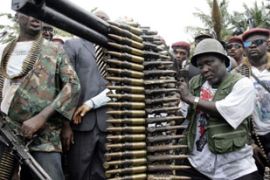Nigeria rebel disarms under amnesty
Crowds gather to welcome latest Niger delta leader to accept government deal.

“The last militant groups are giving up arms, and that means peace is coming back.”
Surrender
Tompolo was the latest rebel leader to accept the amnesty deal, which was originally offered in June, before it expires at midnight on Sunday.
He arrived in Warri by presidential jet, accompanied by Timi Alaibe, Yar’Adua’s adviser on Niger Delta matters, after signing the amnesty in Abuja.
|
“If they refuse to develop our region we will go back to the creeks” Ateke Tom, leader of |
“Today is the greatest day for Nigeria,” Tompolo said as he stepped off the plane.
Two other commanders from the eastern delta laid down their arms a day earlier, on Saturday.
Farah Dagogo, a senior rebel commander, surrendered his weapons in the oil city of Port Harcourt.
“I Farah Dagogo, overall field commander for the Movement for the Emancipation of the Niger Delta [Mend] accept together with field commanders in Rivers state, the presidential offer of amnesty to militants who lay down their weapons,” he said.
“We are surrendering all weapons under our direct control.”
Ateke Tom, the leader of the ethnic Ijaw Niger Delta Vigilante group, and around 5,000 of his fighters handed over their weapons at a ceremony on a beach in the city.
But he warned that his fighters would resume attacks if authorities fail to make good on a pledge to invest in the delta.
“If they refuse to develop our region we will go back to the creeks,” he said.
New campaign
Mend, which dismissed the amnesty as a charade, said it has replaced its military command.
“All commanders have been replaced … and the next phase of our campaign will commence soon,” it said in a statement.
Henry Okah, the group’s leader, who was freed in July as part of a government amnesty deal offered to the rebels after treason charges against him were dropped, said unrest was likely to continue in the region because the root cause of the violence had not been addressed.
The rebels, who say they are fighting for a fairer distribution of the region’s wealth, launched repeated attacks on oil infrastructure and government forces across the delta causing a slump in production.
Despite Nigeria’s oil riches, the vast majority of its 140 million people live on $2 a day or less, and some of the most acute poverty is in the villages of the delta.
Daily oil production has slipped to 1.7 million barrels per day from 2.6 million in January 2006 in Africa’s top producer.